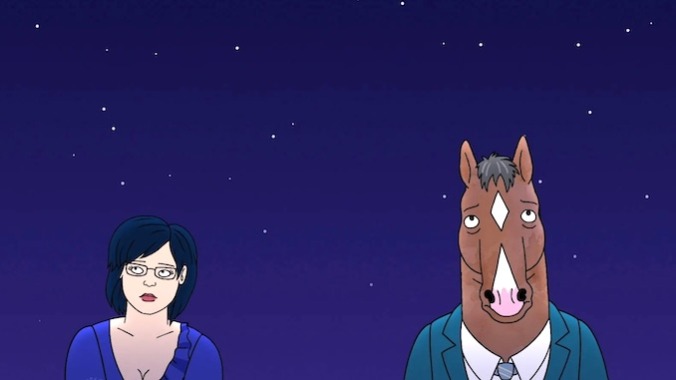TV Rewind: Bojack Horseman Remains the Best Depiction of Depression in Media Thanks to Diane Nguyen
Photo Courtesy of Netflix
Editor’s Note: Welcome to our TV Rewind column! The Paste writers are diving into the streaming catalogue to discuss some of our favorite classic series as well as great shows we’re watching for the first time. Come relive your TV past with us, or discover what should be your next binge watch below:

Bojack Horseman is utterly peerless. Raphael Bob-Waksberg’s creation is the single most human show to have ever graced the small screen—and its star is an anthropomorphic animated horse. For every frame that bursts with animal puns, there’s a line of dialogue that guts you like a Thanksgiving turkey. It’s relentlessly inventive with its medium, from the hyper-specific structure of its seasons (the 11th episode is always the most devastating, each season is only allowed one use of the “f-word,” and so on) to its experimental bottle episodes (see Season 4’s “Fish Out of Water,” which was almost entirely absent of any spoken language, or Season 5’s “Free Churro,” which took the opposite tack and instead made the entire episode a single 20-minute long eulogy) to how thoroughly it took advantage of myriad forms of animation to portray different states of mind and inebriation. But more than anything else, Bojack Horseman is a six-season character study, and a phenomenal one at that. It’s been rightfully and frequently lauded as one of the best—if not the best—depictions of mental illness and addiction in recent media history, given that its titular horse (played with gravelly verve by Will Arnett) struggles immensely with both.
However, it’s not Bojack alone that puts the Netflix original’s portrayal of depression in a class all its own; while the show’s treatment of Bojack’s self-destructive misery is incredible in its own right, both the horse and his many problems are not quite the first of their kind. Bojack is undoubtedly the very best of his archetype—which is richly deserving of praise in itself, given how many Prideful Problematic Men With Issues scowl their way onto our screens (and how few of them are legitimately interesting, well-written characters whose consequences are reckoned with)—but he’s an archetype nonetheless. The washed-up, miserable celebrity is a classic trope, as is the cynical, caustic, too-smart-for-his-own-good man who destroys everything he touches, and while Bojack is so good it turns these cliches on their head, it can’t be the titular horse alone that makes the show’s portrait of depression so uniquely resonant, so comprehensive and thorough. What truly sets Bojack’s study of mental illness apart is its refusal to stop at Bojack himself; depression is not one-size-fits-all, and Bojack Horseman understands that more than any other media I’ve had the pleasure of consuming. Case in point: the characterization of the show’s arguable deuteragonist, Diane Nguyen (voiced by Alison Brie).
Diane Nguyen does not seem particularly interesting in the show’s early episodes—but then, neither does Bojack Horseman itself, as it ingeniously spent the first half of Season 1 relying on adult animation tropes, gags, and beats (a la Rick and Morty) all for the express purpose of subverting every expectation before the season’s end. Diane, who entered the show as the ghostwriter Bojack hired to help author his memoir, originally seemed to play the role of the appealing, competent, slightly nerdy woman who inspires the cynical male anti-hero to be a better person, Manic Pixie Dream Girl-style. Endearingly awkward and sharply feminist, Diane was likable, but didn’t seem like much more than every other “voice of reason” female sidekick. This quickly changes; by the third season, she’s neck-deep in a depressive episode, crashing on Bojack’s couch for two months as her self-image crashes down around her.
The series emphasizes that Diane is just as troubled as Bojack, albeit in different ways; gradually, it becomes evident that she spends her days desperately trying to avoid confronting the fact that she may not be the person she thought she was. She spent much of the first few seasons attempting to convince herself she was simply unhappy with her unsatisfactory environment, but it becomes clear that the pervasive feeling of emptiness might, in fact, have less to do with her surroundings than the one constant within them: Diane herself. It’s particularly rare to see a female depiction of depression that is as thorough, honest, and subtle as Diane’s: she is not sobbing all the time, not self-harming or refusing to eat. Bojack can afford to externalize his depression, both literally and metaphorically, but Diane, who has spent her life fighting tooth and nail to be taken seriously despite her gender, can’t allow hers to so much as surface. But, despite her best efforts, it does.
Diane Nguyen is not a perfect character: after all, she is a Vietnamese-American woman played by a white actress (which the show has very much gone on record as regretting), and whose ethnicity wasn’t meaningfully addressed until the show’s fifth season. But as precarious as that aspect of her characterization is, Diane herself is crucial to Bojack Horseman’s central project. She’s much more than a friend, love interest, or even foil to Bojack himself; she’s a delayed mirror, a reflection with a lag. We watch Bojack struggle through his long-standing awareness of his own misery at the same time as we watch Diane struggle to acknowledge her own—it’s the same journey, but Bojack embarked on it prior to the show’s start, while Diane gradually falls backward into it as the show progresses. The same journey, but not the same manifestations of it, nor the same destinations.
-

-

-

-

-

-

-

-

-

-

-

-

-

-

-

-

-

-

-

-

-

-

-

-

-

-

-

-

-

-

-

-

-

-

-

-

-

-

-

-








































